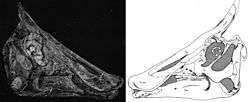Saurolophini
| Saurolophins Temporal range: Late Cretaceous,[1] 75.5–66 Ma | |
|---|---|
 | |
| Photo and interpretive drawing of the holotype skull of Saurolophus osborni | |
| Scientific classification | |
| Kingdom: | Animalia |
| Phylum: | Chordata |
| Class: | Reptilia |
| Clade: | Dinosauria |
| Order: | †Ornithischia |
| Suborder: | †Ornithopoda |
| Family: | †Hadrosauridae |
| Clade: | †Euhadrosauria |
| Subfamily: | †Saurolophinae |
| Tribe: | †Saurolophini Brett-Surman, 1989 |
| Type species | |
| Saurolophus osborni Brown, 1912 | |
| Genera[1] | |
|
Augustynolophus | |
Saurolophini is a tribe of saurolophine hadrosaurid native to North America and Asia. It includes Saurolophus (from Canada and Mongolia), Augustynolophus (from the United States), and Prosaurolophus (from Alberta, Canada, and Montana, U.S.). Kerberosaurus and Kundurosaurus may also be members.[2]
Fossils of saurolophins have been found in Canada, the United States and Asia, with the North American fossils being older than the Asian, suggesting saurolophins migrated intra-continentally.[1]
See also
References
- 1 2 3 Prieto-Márquez, A.; Wagner, J.R. (2013). "A new species of saurolophine hadrosaurid dinosaur from the Late Cretaceous of the Pacific coast of North America". Acta Palaeontologica Polonica. 58 (2): 255–268. doi:10.4202/app.2011.0049.
- ↑ Godefroit, P.; Bolotsky, Y. L.; Lauters, P. (2012). Joger, Ulrich, ed. "A New Saurolophine Dinosaur from the Latest Cretaceous of Far Eastern Russia". PLoS ONE. 7 (5): e36849. doi:10.1371/journal.pone.0036849. PMC 3364265
 . PMID 22666331.
. PMID 22666331.
This article is issued from Wikipedia - version of the 4/15/2016. The text is available under the Creative Commons Attribution/Share Alike but additional terms may apply for the media files.